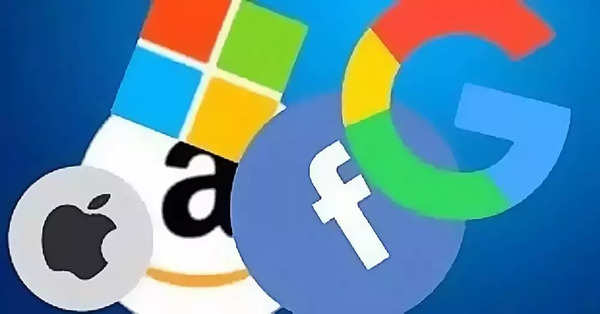
In 2023, tech giants like Alphabet, Microsoft, and Meta (formerly Facebook) made significant advancements in artificial intelligence (AI). Alphabet introduced language models Bard and Gemini, aiming to surpass OpenAI's ChatGPT. Microsoft incorporated ChatGPT into its services, while also strengthening its Azure AI platform. Meta unveiled Massively Multilingual Speech (MMS) and an AI sandbox. Amazon focused on its Olympus LLM AI model and expanded AWS Bedrock. Despite progress, concerns about AI bias and misuse persist. The future of AI remains uncertain, as tech companies compete in an AI arms race.
2023
wasn't just the year of the Metaverse's awkward growing pains or the continued reign of TikTok's dance challenges. It was the year the
,
Microsoft
, and
Meta
,
Amazon
and many more pumped the
AI
accelerator pedal to the metal, leaving everyone talking about just one thing: artificial intelligence.
Google: Bard, Gemini and more
Alphabet's overlords flexed its AI muscle this year, unveiling a language model so vast and powerful it could write you a sonnet about astrophysics — all with the aim of catching up and beating
OpenAI
’s ChatGPT.
Google started the year with Bard and ended with Gemini — focusing fully on generative AI. Google wasn’t restricting itself to just consumer-centric AI but also made strides with models that could help in healthcare among other things. Google CEO Sundar Pichai has said that AI will be the most important technology the world will ever work on. Generating different creative text formats, translating languages, and answering your questions in an informative way — that is the AI order for the day at Google.
Bard is still not there when compared to ChatGPT. It is inaccurate at times and also relatively slow. It does give you the option of drafts. Over the year though. Bard’s ability to learn and adapt in real-time made it feel like you were actually talking to a person, albeit a person that makes quite a few errors. Google will be hoping that its Gemini models iron out the flaws and put the company ahead in the AI race.
Microsoft and OpenAI: A fruitful partnership
Not to be outdone in the AI game, Microsoft unleashed a two-pronged attack this year. It incorporated OpenAI’s ChatGPT in a host of services, starting from Windows and Bing to Microsoft Office. Copilot is Microsoft’s big bet on AI and it wants to leverage the Windows and Office brand equity to power up the future. Bing browser has the same model as ChatGPT but the numbers didn’t really blow up as Microsoft would have expected.
Microsoft also beefed up their Azure AI platform, adding a slew of new tools and services that make it easier for developers to build and deploy AI applications. From image recognition to anomaly detection, Azure AI is looking to get a piece of the AI pie. And with
OpenAI — the company behind ChatGPT — continued to amass users and unveiled ChatGPT Plus, a paid subscription model. ChatGPT has become faster and smarter but continues to err — at least the free version did. OpenAI had a lot of drama behind the scenes but continues to be the benchmark in generative AI, courtesy the wild popularity of ChatGPT.

Meta: Moving from Metaverse?
Meta (formerly Facebook) has been the king of all things social media and, as of late, the fledgling flagbearer of Metaverse. Meta's AI game this year was all about doing things at the backend. Meta unveiled a new large language model (LLM) with the aim of preserving the world’s languages. Called Massively Multilingual Speech (MMS), the model can identify more than 4,000 spoken languages. Another Meta AI tool unveiled in 2023 was the AI sandbox. What it does is that it gives brands the choice to generate variations of ad copies. Furthermore, AI Sandbox helps to create ads with funky and trendy backdrops for ad copies.
Amazon: Aiming for the A-Z of AI
Amazon wasn’t far behind but adopted a totally different approach. It has been reported that Amazon has Olympus LLM in the works — its most powerful AI model. It is aimed at corporate customers who will need AI to simplify tasks and handle complex issues as well. Then there was AWS Bedrock. Amazon expanded offerings on AWS Bedrock, its platform for building and deploying AI applications, adding integrations with popular language models like Anthropic and Cohere. Amazon wasn’t far behind in generative and conversational AI. The company introduced new features for Amazon Lex, their chatbot platform, including utterance generation and Conversational FAQ with generative AI, making for more natural and engaging interactions.
The road ahead
It wasn't all sunshine and rainbows in the AI land. Concerns about bias, discrimination, and the potential misuse of AI continued to dominate the conversation. Deepfakes have already shown the misuse of AI and 2024 being an election year in many countries, we will hear a lot about the harm AI can inflict.
So, what does the future hold for AI? The time for AI is well and truly here. But one thing is for sure: all the big tech companies are in an
AI arms race
, and the rest of us are along for the ride. Whether this leads to a utopia powered by benevolent AI overlords or a dystopian future rule, perhaps that's a question for the next big language model to ponder. What say, ChatGPT or Bard?












 English (US) ·
English (US) ·